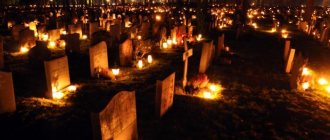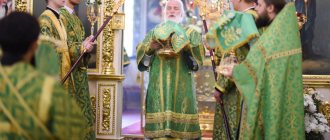Psalm instead of prayer
Reverend Arseny of Cappadocia (1840 - 1924), a Greek who lived in Turkey, compiled an explanation of the Psalter. He indicated in what everyday situations one or another psalm could be read. This was mainly due to the lack of special prayers in Orthodoxy for various needs and needs. For example, Psalm 22 is recommended to be read to pacify disobedient children. In Orthodox church practice, it is customary to read all psalms in Church Slavonic. However, for most modern people the meaning of prayers remains unclear. Natural questions arise. Is it possible to read Psalm 23 in Russian? Why read Psalm 23 at all? Is there an accessible and intelligible interpretation of the psalm?
Opened Psalter
How to read
Basically, clergy recommend reading these appeals all the time. If you have reached the end of the book, then start over. Such constant rereading will contribute to a better understanding of the meaning. If you decide to read them constantly, then it is advisable to obtain the blessing of a priest for such a matter. This is quite difficult and it will take a lot of effort to accomplish this. You will even have to confront some forces that can resist you.
The best article for you, go to: Reading with Psalms
Before you start reading, you should light a candle. If you don't do this, then don't despair. This is not considered a sin. The main thing is your attitude to prayer. Beginners can begin their acquaintance with these texts in Russian. Although during services it is conducted in Church Slavonic. It happens that while reading, you need to distract yourself for a while. Nothing wrong with that. Start where you left off. But still try not to interrupt the process.
The Psalter itself is divided into kathismas. You need to start the process with initial prayers and go one by one. The ending should be the one indicated in the text. You also need to know for what needs the read psalms can be used.
If you have a desire to remember someone during a ceremony, then you should do it as follows:
- When reading “Glory” say the following words:
Glory to the Father, and the Son, and the Holy Spirit, now and ever, and unto ages of ages. Amen.
Alleluia, alleluia, alleluia, glory to You, O God. (Three times).
- then list the names,
- then say the following:
Lord have mercy. (Three times).
Glory to the Father, and the Son, and the Holy Spirit, now and ever and unto ages of ages. Amen.
Remember that you cannot read for peace and health at the same time. This can be done only in one kathisma, then on different “Slavas”.
What is the Psalter and Psalms
A widely known book of the Old Testament is the Psalter. It consists of separate chants - psalms. The author of most of the psalms is the king and prophet David (1035-965 BC). The features of these hymns dedicated to God are the personal experiences of the psalmist. He is like a child, striving to share his joy, anxiety, fears with his Father, asking for forgiveness, help and intercession.
“The Book of Psalms... is a common treasury of good teachings and carefully seeks out what is beneficial to everyone. She also heals old wounds of the soul, and gives quick healing to the recently wounded. He restores what is painful and supports what is not damaged. In general, as much as possible, he destroys the passions that dominate souls in human life under different forms.
The psalm is the silence of the soul, the dispenser of peace. It softens the irritability of the soul and disciplines intemperance. It calms rebellious and disturbing thoughts. The psalm is a mediator of friendship, unity between distant people and reconciliation of those at war. For who can
Briefly about the Psalter
The Psalter is one of the most famous Old Testament books , created under the inspiration of the Holy Spirit. Its name comes from an ancient plucked instrument, its analogue is the Russian gusli. This book is revered by representatives of various Christian denominations, Jews, and is even reflected in the Islamic sacred text Zabur. Not a single Orthodox service is complete without reading it.
Archpriest Alexey Ladygin explains:
“The Psalter is an amazing, divinely inspired book, most of which was written by the holy psalmist David. She consoles us and pleases us, she reveals to us the spiritual world and the special attitude of the Lord towards us. At the same time, it tells us how to behave with God, what underlies our lives, what strengthens us, and what leads to defeat.”
What is a psalm?
Psalms are prayer chants of various contents, united by a common theme of the relationship between the Almighty Lord and man. The Psalms are considered a model of reverent heartfelt prayer. The compiler of most of them is the royal prophet David, who lived 10 centuries before the Redeemer came to the world. Some chants are attributed to the authorship of those close to the king, as well as to his son Solomon and Moses the Seer of God.
Psalm 23 in Church Slavonic
The Lord shepherds me and deprives me of nothing. In a green place, there they settled me, on the water they brought me up in peace. Convert my soul, guide me on the path of righteousness, for Your name’s sake. Even if I walk in the midst of the shadow of death, I will fear no evil, for You are with me, Your rod and Your club, that will comfort me. Thou hast prepared a table before me against those who were cold against me, Thou hast anointed my head with oil, and Thy cup makes me drunken, like a mighty power. And Thy mercy will marry me all the days of my life, and make me dwell in the house of the Lord for many days.
Psalm 22 in Russian
The Lord is my Shepherd; I will lack for nothing: He makes me lie down in green pastures and leads me beside still waters, He strengthens my soul, He guides me in the paths of righteousness for His name’s sake. Though I walk through the valley of the shadow of death, I will fear no evil, for You are with me; Your rod and Your staff - they calm me. Thou hast prepared a table before me in the sight of my enemies; anointed my head with oil; my cup is overflowing. So may [Thy] goodness and mercy follow me all the days of my life, and I will abide in the house of the Lord many days.
Contents of Psalm 22
The psalm does not indicate the time or reasons for its writing. According to the interpretation of Professor Alexander Pavlovich Lopukhin (1852-1904), this psalm can be dated back to the time of King David’s flight from Jerusalem from his son Absalom. Then David was in the Mahanaim desert and experienced hunger and need. Three men, Sobi, Machir and Barzillai, brought him food in the form of flour, honey, cheese, sheep and grains (2 Samuel 17:27-29). This is indirectly indicated by verse 5 of the psalm.
The main idea of the psalm is “The Lord is my shepherd.” King David called the Lord a shepherd: He protected him from his enemies and provided him with food. Through the words of psalmody, David expressed his consent to follow the Creator, showing an example of complete trust and hope in Him. The Prophet admitted that if he deviates from the true path, the Lord will always guide him to salvation through various life events and direct revelations through other people.
This was the case, for example, when David took Bathsheba as his wife. The king specifically sent her husband to death. At that time, the Lord convicted the king through the prophet Nathan.
Being in a place full of dangers, David retained faith in salvation from God, in protection from enemies. Just as a shepherd protects his sheep from wolves with his staff, so the Lord, by His power, can save a person who trusts in Him. Understanding this brought great joy to the psalmist, which, according to Eastern traditions, was expressed in anointing the hair on his head with vegetable oil.
The shepherd strengthens my soul
What saddens me is that the church often ignores the spiritual needs of people. After all, they are interconnected with the spiritual nature of man. Our thoughts and feelings are the outer barometer of our inner spiritual life.
You know, I think we sometimes go overboard and become “super spiritual heroes” who lack normal human emotions. But in our heart are all thoughts and feelings, intuition and conscience.
My son! listen to my words, and incline your ear to my words; let them not depart from your eyes; keep them within your heart: for they are life to the one who finds them, and health to his whole body. Guard your heart above all else, for from it are the sources of life.
Proverbs 4:21-23
The heart is the place where all human mental processes take place, where all the motives of human actions and behavior originate. This is the center of the essence of man and his being.
In Christian circles in our time, not only human feelings are rejected, but also relationships of the heart. Christ said: “By this everyone will know that you are My disciples, if you have love for one another.” Is love just a choice or a decision of the will? Aren't our feelings of love for each other important? Only a kind attitude towards others and acts of mercy change something in this world.
Think about how many people in churches are lonely and deeply depressed. How many Christians have experienced physical and mental violence. So many broken hearts and wounded emotions. We send our parishioners to unbelieving psychologists and psychotherapists because we don’t know how to help them.
I am very glad to see that counseling is being developed in some churches. Christian counselors care for broken hearts and empty souls.
We must not be callous to the inner core of believers. How long have we been honestly interested in the life of another Christian and asked: “how are you?” Not just: “how are you doing?”, and, without waiting for an answer, they continued to move on. How does he feel? What is his inner spiritual life like? Does he have a close relationship with God and other people?
I understand that this is not accepted among Christians. After all, we believe that the state of our hearts should be revealed only to God. We don't trust our neighbors because they might spread the word that we are not as spiritual people as we seem. This is why there are so few sincere and emotional relationships in our churches.
For you were like wandering sheep, having no shepherd, but have now returned to the Shepherd and Keeper of your souls.
2 Peter 2:25
But all is not lost for us, because Christ is the Shepherd and Guardian of our souls. We can come to Him at any time with our pain and doubts. On Him we cast our worries and fears. From Jesus we learn how to serve our brothers and sisters with love and self-sacrifice.
Christian understanding of Psalm 23
Psalm 22 in Russian has a prophetic reference to Jesus Christ. That is, the Good Shepherd, ready to sacrifice His life to save the sheep - all those who believe in Him - from destruction.
“Everyone who feels the watchful and protective Providence of the good Shepherd Christ over him remains calm and comforted, in the confidence that the rod and club of this Shepherd constitute the most reliable means for protecting him from all enemies: Thy rod and Thy club, they comfort me. According to the explanation of the Fathers of the Church, the rod and club here represent the Cross of Christ, which serves for believers as the best means of salvation for protection from all their enemies, visible and invisible” (Archpriest Grigory Razumovsky, 1883-1967).
Following Him
We believe that the paths of righteousness should be very clearly marked. We want what is right to be obvious. But more often than not, there are many different paths, options and options from which to choose.
Perhaps today you are wondering which step is right for you? This is why we have a Shepherd to guide us. He knows the right choice in any circumstance.
Author - Estera Vieja / firmisrael.org Translation - Igor Padushin for ieshua.org
Donate Last: 02/28. Thank you!
Subscribe: Telegram • Facebook • • • Twitter • Instagram • Youtube
Using the Psalm in Worship
The psalms of King David and other authors served as the basis for church hymnography. This is a special form of conversation with the Lord. The words of the psalms, expressing gratitude and love for the Creator, still remain a prayer standard. It is impossible to imagine a single Orthodox service where psalms are not used. They are part of the life of Christians.
“The psalms of David are the songs of our soul; his prayerful voices and cries are the voices and cries of our spirit, suppressed by sin, oppressed by sorrows and misfortunes. Besides this, where will we find the best examples of prayers, supplications, thanksgivings, praises and glorifications of God, if not in the psalms of David? In the book of psalms, the whole human life, and spiritual dispositions and movements of thoughts are measured and described in words - and beyond what is depicted in it, nothing more can be found in a person” (St. Athanasius of Alexandria, 295-373).
Psalm 22 is included in the Follow-up to Holy Communion. Christians must prepare for this Sacrament not only physically (fasting, abstinence). Spiritual preparation is much more important. The words of the psalm help the believer to tune into the “spiritual wave.” This chant recalls the kind attitude of the Savior towards everyone, who laid down His life for the salvation of people.
“Stop here, sinful and despairing soul, stop, gather your fear-stricken spirit and strengthen yourself. You are a sinner, but the Lord “came to call not the righteous, but sinners to repentance” (Matthew 9:13). You are weak, He is the doctor; you are darkness. He is light, and where should He shed His light, if not on those who sit “in darkness and the shadow of death” (Ps. 106:10)? You are dead. He is life; you are a prisoner of sin, He is your Redeemer. If you are subject to the wrath and condemnation of God, He is the sacrifice that propitiates justice; you are a lost sheep, He is the shepherd who left ninety-nine sheep and is looking for you” (Metropolitan of Moscow Platon Levshin, 1737-1812).
The Lord feeds spiritual needs
In psychology, Maslow's pyramid was developed. It is called the “pyramid of needs,” which is a hierarchical model of human needs. It is a presentation of the ideas of the American psychologist Abraham Maslow. This pyramid reflects one of the most popular and well-known theories of human motivation.
Let's take a quick look at it.
Maslow distributed needs in order of decreasing importance, explaining this construction by the fact that a person cannot have high-level desires while he needs lower things.
At the base of the pyramid are physiological needs: satisfying hunger, thirst, sexual desire, etc. A step higher is the need for security, above it is the need for affection and love, as well as for belonging to any social group.
The next stage is the desire for respect and approval, above which Maslow placed cognitive needs: the thirst for knowledge and consumption of as much information as possible.
Next comes the need for aesthetics: the desire to harmonize life, fill it with beauty and art. And finally, the last step of the pyramid, the highest, is the desire to reveal inner potential or self-actualization.
It is important to note that each of the needs, in his opinion, does not have to be completely satisfied - partial replenishment is enough to move to the next stage.
I am absolutely convinced that a person lives by bread alone only in conditions when there is no bread. But what happens to human aspirations when there is plenty of bread and the stomach is always full? Higher needs appear, and it is they, and not physiological hunger, that control our body. As some needs are satisfied, others arise, higher and higher ones. So gradually, step by step, a person comes to the need for self-development - the highest of them.
Abraham Maslow
But what Maslow did not take into account in his theory was the most important thing - truth, therefore his theory falls apart in the realities of spiritual experience and human life.
He answered and said to him: It is written: “Man shall not live by bread alone, but by every word that proceeds from the mouth of God.”
Matthew 4:4
This is the answer of the Word of God and the Lord Jesus Christ. No one and nothing can satisfy the spiritual hunger of our essence except our Creator. Therefore, a person cannot achieve happiness without God and build heaven on earth. The Good Shepherd makes us rest in the pastures of the Word of God and leads us to the still waters of prayer in the Holy Spirit to satisfy the human spirit.
Christ came to this earth so that we could have the abundant life that He told the woman at the well about. And showed the way how to worship God in spirit and truth.
When Jesus passed through Samaria, He was tired from the long journey and sat down by a well. At this time a woman came from Samaria to draw water. Jesus asked for a drink. And the Samaritan woman expressed her surprise because the Jews did not communicate with them.
But Christ turned to her main spiritual need and said that if she knew who was speaking to her, she would ask Him for living water. He explained to her that people only satisfy their physical and mental needs, so they will always crave and remain unsatisfied.
But whoever drinks of the living water that He provides will find a spiritual and eternal source of living water within his spirit. Therefore, the Word of God and prayer are the unchanging sources of spiritual life and growth in grace.








